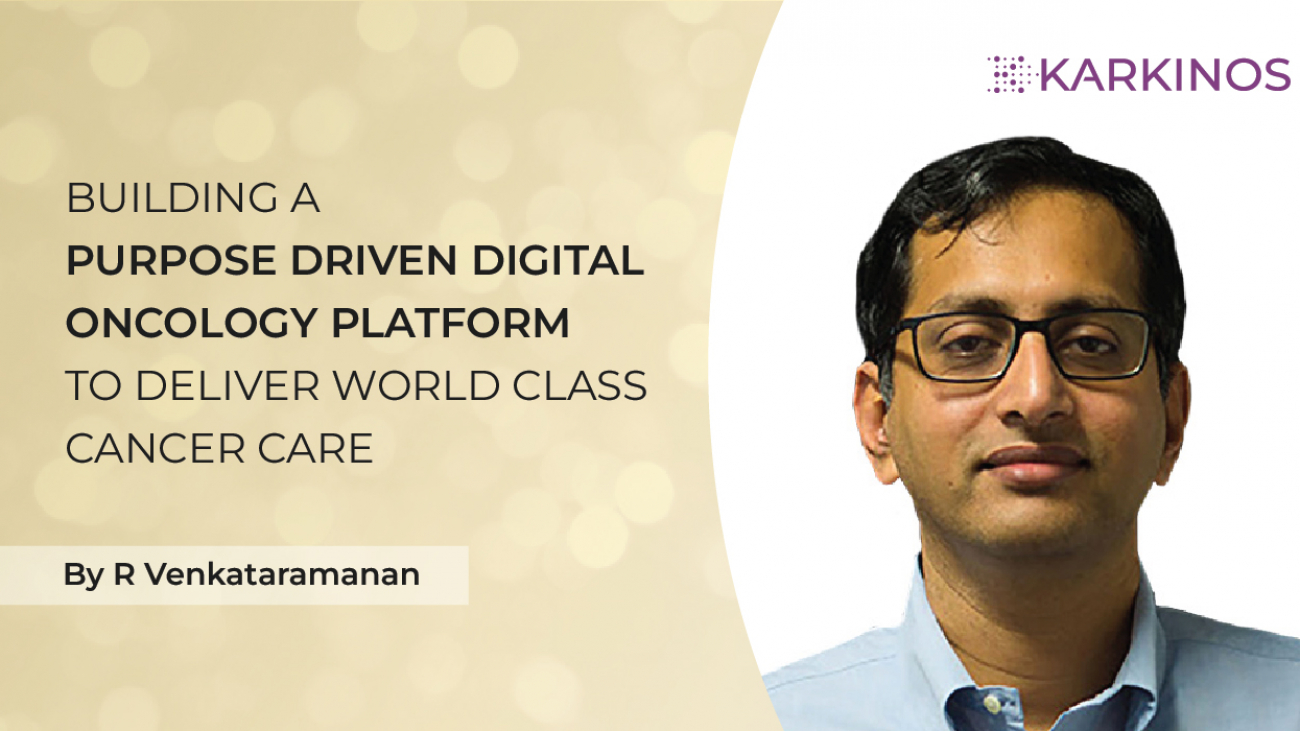Karkinos Healthcare – Building a purpose-driven oncology platform
Vision Statement by R. Venkataramanan, Founder and CEO, Karkinos Healthcare
Karkinos Healthcare is determined to build an end-to-end technology driven oncology-focused managed healthcare platform, where almost no person is deprived of care either by lack of access or by affordability.

BACKGROUND
The design and delivery of Karkinos Healthcare (KH) will be through bespoke solutions for cancer care, as a one stop shop in experience, addressing core market needs for this specialized health care.
The platform will use technology and AI-based continuous feedback to improvise care to our own needs, the learnings of which will be scaled up within India and beyond.
KH is supported by an eclectic founding team with strong technology, healthcare, and finance experience, and a panel of eminent clinical advisors from India and abroad. The team’s efforts are further augmented by its access to best-in class architects, space planners, vendors, technology support engineers, pharma partners — all of whom combine to create the firm’s USP in the field of cancer care delivery.
The team of KH, in their earlier avatars, have the expertise in facilitating the design, development and commissioning of a 700-bed Specialty Oncology Hospital and the redesign/ modernization of an existing hospital, aggregating to 1 million square feet in less than a year’s time. Both have since been commissioned and are fully operational.
In addition, the team has also been instrumental in the design and development of a ‘Hub & Spoke’ Cancer Care hospital network in the North East of India that comprises of 12 hospitals, presently under construction.
KH’s Distributed Cancer Care Network model (DCCN) also finds a mention in the Lancet Oncology.
The context and the need for Karkinos in cancer care
With gross underreporting and inadequate diagnosis, there is a high burden of Cancer in India with almost 1.9 million new cases per year. More than 50% of the cancer patients visit a doctor for the first time, at or past the third stage of the disease, thereby requiring multi-modal therapy that is spread over 2-3 years and helplessly succumb to the disease.
Cancer causes massive personal and financial burden not only on the patient, but also on the patient’s entire family with the out-of-pocket expenses being as high as 70% of the total treatment cost. Along with the loss of working days for the patient there is loss for the family and resultant detriment to the country’s GDP.
With the rise in cancer cases across the country, and lack of adequate cancer care infrastructure and medical professionals, there is a need to assess the cancer care requirement better and prepare to bridge the demand- supply gap by improving accessibility, availability and affordability in cancer care.
In addition, there is also an urgent need for extensive early detection and prevention initiatives given the remarkably high tobacco consumption and low awareness about the risk factors in the country.
The cancer care diagnostic and delivery platform in India is extremely inadequate. Multiple players operate in silos thereby contributing to a healthcare infrastructure that is fragmented, inaccessible by patients and thus leading to the unsatisfactory patient experience. Existing data in the public domain and market research has demonstrated a significant gap in the supply of oncology beds, linear accelerators, radiotherapy technicians, oncologists, and other resources required in basic care. With ever-increasing demand from patients seeking treatment, the demand/supply gap is widening with the passage of time.
This is the unaddressed opportunity that looms large on us today. However, there is a need to revisit the operating model and encourage the establishment of participatory systems rather than proprietary systems.
The Hub and Spoke and Further Spoke approach
KH aims to significantly enhance access to cancer care services by creating a technology enabled data driven platform wherein the knowledge architecture is centralized, and the delivery systems are democratized and distributed.
The solution encompasses a ‘hub- and-spoke and further spoke’ hospital infrastructure on the back of robust technology and clinical decision support systems that enables service delivery in a wide patient catchment.
The model relies on a technology backbone that enables anchor referral hospital/s that cater to complex cases, surgery, and radiotherapy supported by a network of smaller centers for catering to diagnosis and ongoing treatment so that the treatment can be decentralized, thereby reducing the load on apex centers for non- complex treatment while increasing accessibility and cutting down on loss of productive days for the family.
The network is designed to be ‘wired’ to enable connectivity amongst all centers, seamless access to data, diagnostics, and patient consulting – which includes a combination of a central knowledge repository, diagnostic capabilities, and a common training HR pool. It is, therefore, essential that the ‘hub and spoke and further spoke’ cancer care hospital network be supported by core investments in a phygital infrastructure (Karkinos cloud and a clinical workflow orchestration and care coordination engine).
This would entail tools/apps that will help collect data from Tier 3-4 medical clinics and aggregation & reporting from Tier 1-2 hospitals. The architecture will focus on the creation of the Karkinos backbone infrastructure and open APIs followed by a few ‘core apps’.
Some of the apps would be open source for the developer community to emulate and develop more apps required by the service providers in Karkinos’ network.
The priority of these apps is driven by customers, the diagnostics and treatment modalities that they currently have, and their maturity in handling clinical data. The data collected will be key drivers of understanding specific genomic profiles of tumours with the clinical annotation that will aid:
a) A technology platform for diagnosis and data mining; and
b) A shared services infrastructure training facility and ongoing clinical R&D.
KH strongly believes that technology will be the key enabler for the de-centralization of expert care. The technology platform consists of a distributed architecture with the development of tools/applications that will integrate seamlessly and securely to a Karkinos backbone in drug discovery, diagnostics and treatment strategies. This will nurture innovation and newer therapeutic approaches to improve outcomes, in addition, to becoming a strong revenue generator. The clinical data repository, curated knowledge base and advance analytics will be part of the Karkinos’ offerings.
A vision powered by 4Ds
Detection & Diagnosis – Establishment of participatory systems and near home care, research on genomics as a foundation approach for prevention, innovation and game-based outreach approach for early diagnosis and wellness.
Data & Research – Contribute towards Atmanirbhar Bharat through drug discovery research and treatment innovation, large scale screening and longitudinal data to build robust AI/ML analytics, predictive models and clinical decision support system for real world evidence.
Deliver – managed health care – 2 million+ patients served annually, 10 million+ patient hours saved annually.
The roadmap
KH, over the next 18 months, will be focused on creating the foundation for the following components –
- A state-of-the-art technology platform curated for oncology
- A knowledge network with medical protocols, surgical skills, digital pathology center
- Along with fifty Level 4, fifteen Level 3, five Level 2, and one Level 1 centers.
The majority of the economic interest of the founders will be held in a Charitable trust and the economic benefit thus accrued will be deployed across similar societal causes and in advancement of research, education, and patient care.
A proof-of-concept for the execution of KH’s roadmap has been planned in the State of Kerala. MoUs are signed with Mar Baselios Medical Mission Hospital for early detection and day care services and with Chottanikkara Medical Relief Society.
An additional pipeline of 12-15 brownfield assets have been identified. An Expression of Interest has been shared with the Manipur Government for setting up of a state-of-the-art 150 bedded multi-specialty cancer institute with full infrastructure and a robust technological support under DBFO (Design, Build, Finance, and Operate) investment model.

 Prior to founding Karkinos, Venkat spent more than 15 years with the Tata Group in various capacities. His last assignment in the Tata Group was as the Managing Trustee of the Tata Trusts where he was responsible for the operations, oversight, and co-ordination of the Trusts’ development programs worth more than USD 1B. He was instrumental in the conceptualization of the Distributed Cancer Care Network and has led the development of multiple apex cancer hospitals across the country.
Prior to founding Karkinos, Venkat spent more than 15 years with the Tata Group in various capacities. His last assignment in the Tata Group was as the Managing Trustee of the Tata Trusts where he was responsible for the operations, oversight, and co-ordination of the Trusts’ development programs worth more than USD 1B. He was instrumental in the conceptualization of the Distributed Cancer Care Network and has led the development of multiple apex cancer hospitals across the country.